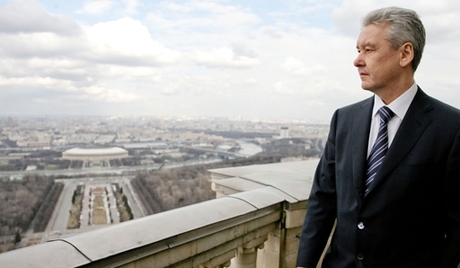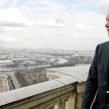
Snap Elections of City Mayor in Moscow
Publication: Eurasia Daily Monitor Volume: 10 Issue: 107
By:

After several days of media speculation fueled by news leaks, Moscow City Mayor Sergei Sobyanin (54) announced he is resigning to seek reelection in a snap ballot on September 8, which under current Russian legislation is the only day in 2013 on which any regional elections may be held. President Vladimir Putin promptly accepted Sobyanin’s resignation and appointed him acting Moscow City chief, pending elections. Elections must be officially announced no less than 90 days before the ballot, so the Moscow City Duma, fully controlled by the ruling United Russia (UR) party, must meet and vote in a special session before June 9, for the Sobyanin reelection to go ahead (Interfax, June 6).
Moscow has an official population of some 12 million, of whom around 9 million are officially registered permanent residents (over 7 million are eligible voters). There are millions of Russian citizens and foreigners, who live and work in Moscow under temporary registration or without any, often paying bribes to the police to avoid deportation. Millions of Moskovskaya oblast residents commute daily to work in Moscow, swelling the workday population to some 20 million. Moscow is the undisputed political, economic, financial and cultural center of Russia; there are millions of cars daily in its streets, creating some of the worst traffic jams in the world. Moscow City is the richest and most populous administrative entity of the Russian Federation, and the mayor is its governor. Sobyanin was Putin’s Kremlin administration chief from 2005 to 2008 and deputy prime minister from 2008 to 2010. In 2010, a terrible heat wave and suffocating smoke from out-of-town wildfires turned Moscow into an inferno. Consequently, the long-time city strongman Yuri Luzkov (the Chicago-style Moscow mayor from 1992 to 2010) was dismissed following a public brawl with the Kremlin and replaced by Sobyanin. In 2012, after massive pro-democracy rallies in Moscow, gubernatorial elections in Russia were reinstated. Sobyanin could continue as appointed city chief until 2015, but according to polls, some 70 percent of Muscovites want to elect their mayor (Interfax, June 5).
In the 2012 presidential elections, Moscow was the only federation entity in which Putin received less than 50 percent of the popular vote despite heavy vote rigging in his favor. The snap elections announced this week seem to have caught the opposition unprepared, while the relatively short time left until election day next September and the beginning summer recess period could guarantee Sobyanin an easy victory. The second most popular possible candidate to become mayor is the billionaire-turned-politician Mikhail Prokhorov, who at the presidential elections in 2012 in Moscow garnered over 20 percent of the popular vote. Prokhorov announced he is still considering a possible run, but most experts believe he will not. Recently enacted Russian law bars election candidates who own any foreign bank accounts or equity. Prokhorov has such accounts and his business empire (as most other business empires in Russia) is apparently controlled through offshore shell companies. Reorganizing Prokhorov’s multi-billion-dollar ownership structures could be a tricky and costly business with only a couple of weeks left to do it (Kommersant, June 6).
Former Mayor Luzkov (76) is still well known and popular in Moscow, but apparently he has decided not to run (Interfax, June 5). Anti-corruption activist Alexei Navalny, liberal Yabloko party leader Sergei Mitrokhin and leftist activist Sergei Udaltzov have already announced their intention to run. Official opposition parties represented in the Duma: the Communists and the Liberal-Democratic party (LDPR) of nationalist demagogue Vladimir Zhirinovsky will most likely field candidates without any genuine intention of winning. A Duma deputy from the LDPR and former KGB officer Andrey Lugovoy, wanted for questioning by British police on suspicion of poisoning Alexander Litvinenko with radioactive polonium in London in 2006, has been nominated as a possible LDPR mayoral candidate. Under Russian law, the election must be contested by at least two candidates, or it is invalid. If the pro-democracy opposition decides to boycott, Sobyanin’s reelection would likely be validated by having some Kremlin-controlled opponent on the ballot, say from the LDPR (Kommersant, June 6).
To win outright, Sobyanin must receive over 50 percent of the popular vote on September 8. The pro-democracy opposition will not attempt to field a joint candidate, hoping a crowd of opponents has a better chance to gather together enough votes to possibly force a second ballot, in which only two top candidates may run. But the chances of the opposition actually fielding any candidates seem slim. Navalny is on trial in Kirov on trumped-up embezzlement charges and may be disqualified via a felony conviction before the election. Udaltzov is under house arrest and may soon go on trail for conspiracy to incite riots during a protest rally on May 6, 2012. To run in the election, an independent candidate must gather some 80,000 voter signatures and also pass the so called “municipal barrier”—gather the support of at least 116 elected municipal councilors evenly spread out in the 110 municipal districts of Moscow with each councilor allowed to support only one given candidate (Kommersant, June 6).
Sobyanin’s campaign has announced he will be running as an independent candidate to distance himself from the notorious UR that Navalny has effectively re-christened “the party of crooks and thieves.” Sobyanin will also need to gather voter and municipal councilor signatures, but will surely succeed, since he has the full support of the Kremlin and the UR, which controls a majority in all of Moscow’s municipal councils. (Interfax, June 6).
Sobyanin’s reelection appears guaranteed, but its declared aim of giving him added legitimacy may be elusive. The election in Moscow will be closely watched by independent journalists and observers. Vote rigging and opposition candidate harassment will be reported with vigor. Sobyanin’s reelection will almost surely be considered illegitimate by many in Moscow and may not add anything to his present standing. Massive opposition rallies began in December 2011 after the rigged Duma elections. They continued until the presidential election in March 2012, and began to lose momentum afterward, with no new elections anywhere in sight. A snap election campaign in the summer of 2013 in Moscow could revitalize the opposition once again, possibly culminating in September with a public outcry over a rigged outcome.




